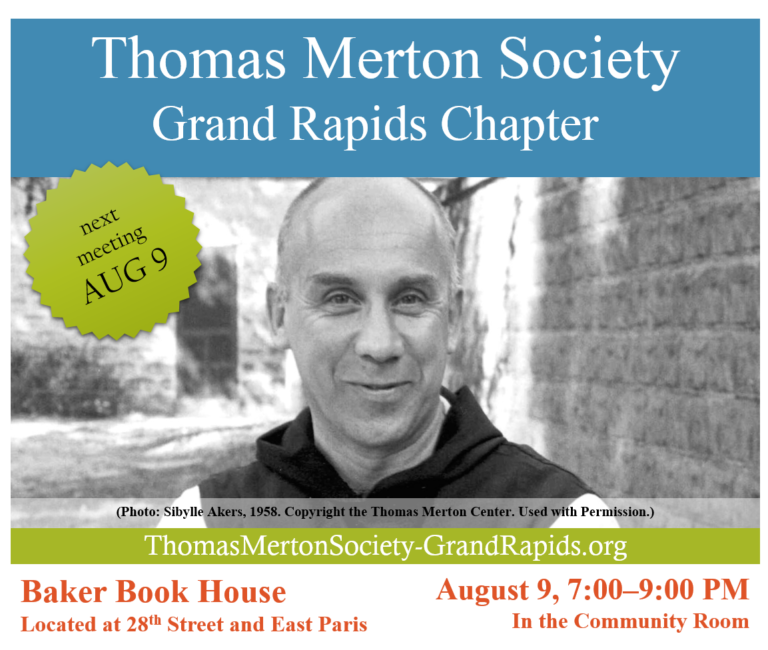 The next meeting of the Grand Rapids chapter of the International Thomas Merton Society will be Wednesday, August 9th, at 7pm at Baker Book House near the corner of 28th Street and East Paris in Grand Rapids, Michigan.
The next meeting of the Grand Rapids chapter of the International Thomas Merton Society will be Wednesday, August 9th, at 7pm at Baker Book House near the corner of 28th Street and East Paris in Grand Rapids, Michigan.
We will discuss chapters 6-9 of Thomas Merton’s book Contemplative Prayer.
Here are some suggested questions to ponder ahead of time:
CHAPTER VI
1. Merton again brings up the dualism that so many experience today – the perceived difference between public and private prayer. Do you see your spiritual life in that way – having a private side and a public side to it?
2. What is the Rule of St. Benedict?
3. Who were John Cassian and St. Basil?
4. What did you learn from Chapter VI that you didn’t know before?
CHAPTER VII
1. Why did St. Gregory the Great think contemplative prayer was a problem?
2. Do you make a distinction regarding an active idea of prayer versus a contemplative idea of prayer? (p. 29)
3. Are you able to achieve “the balance that is required” between the two? (p. 30)
4. Who was St. Bernard of Clairvaux? (p. 30)
CHAPTER VIII
1. St. Bernard and Merton write about the monastic life being found in three vocations. Bernard names three people. Who are they? Merton names three vocations. What are they?
2. Have you ever thought of Mary as being a contemplative?
3. “Christ comes only in secret to those who have entered the inner chamber and closed the door behind them.” Agree? Or disagree?
4. “Peter the Venerable, St. Bernard’s contemporary and Abbot of Cluny, was less hesitant and even more explicit than Bernard in encouraging solitary private prayer.” Do you agree “solitary private prayer” is important? If so, how do you make sure you get time for it?
CHAPTER IX
1. Who was Peter of Celles? When and where did he live? When did he die?
2. Repeatedly, Merton writes of potential (often illusory) conflicts between contemplation and action. Do you see any conflicts between the two in your own life? If so, how do you overcome them?
3. “Without virtue there can be no real and lasting contemplation. Without the labor of discipline there can be no rest in love.” Agree? or disagree?
4. These chapters are about monks. Do you find this information applicable to your own life, even though you are not a monk?
These are only suggested questions. And it’s likely we won’t get to all of them. But it’s fun to try.
See you there!
NOTE: If you’d like to download the pdf for our next meeting and share it with others, we’d be much obliged. Right click here.
